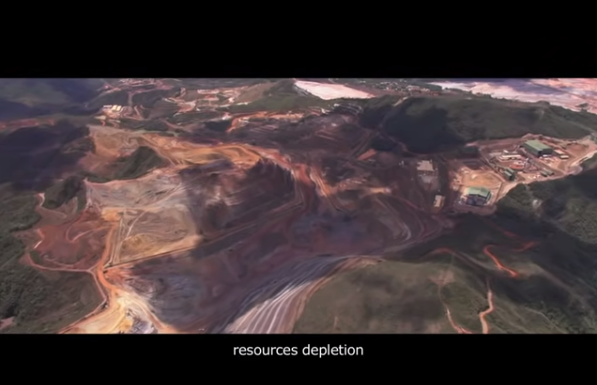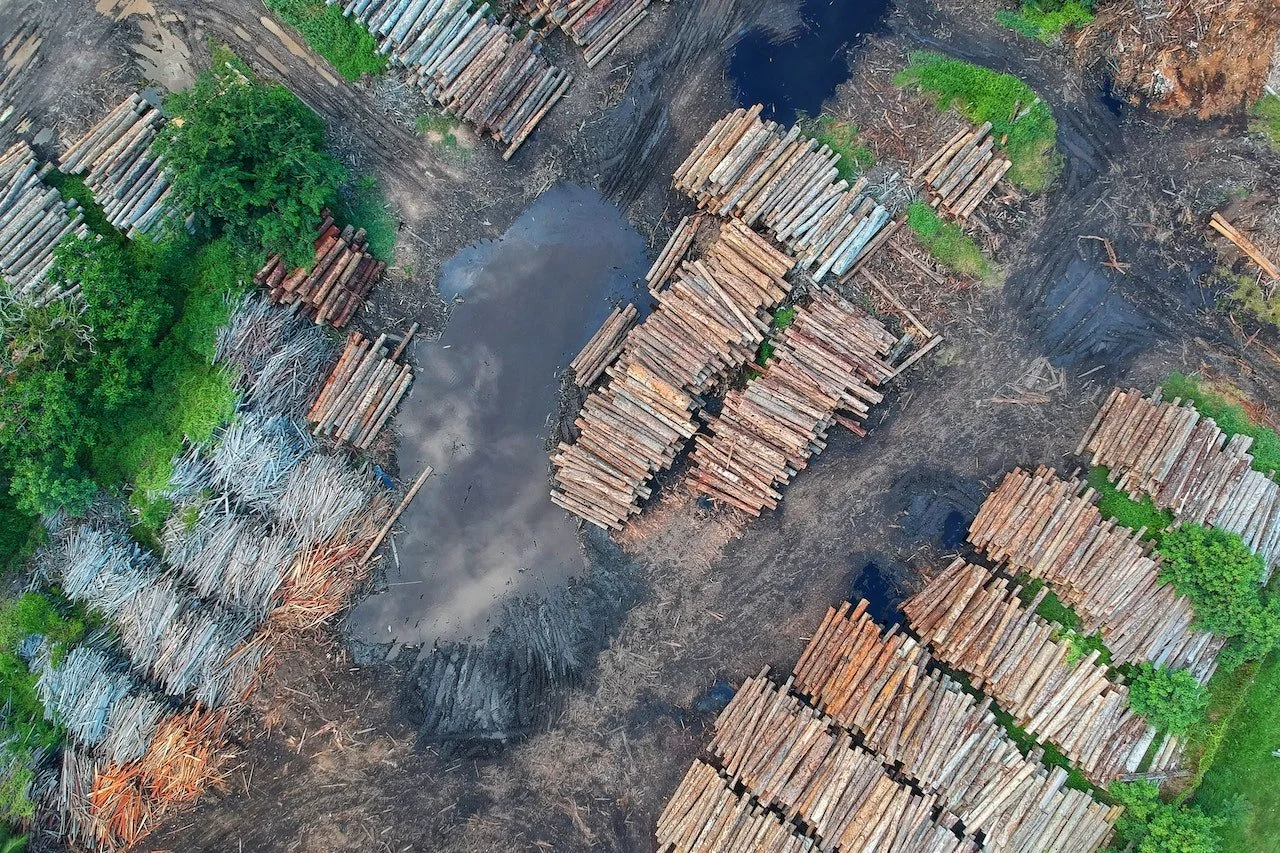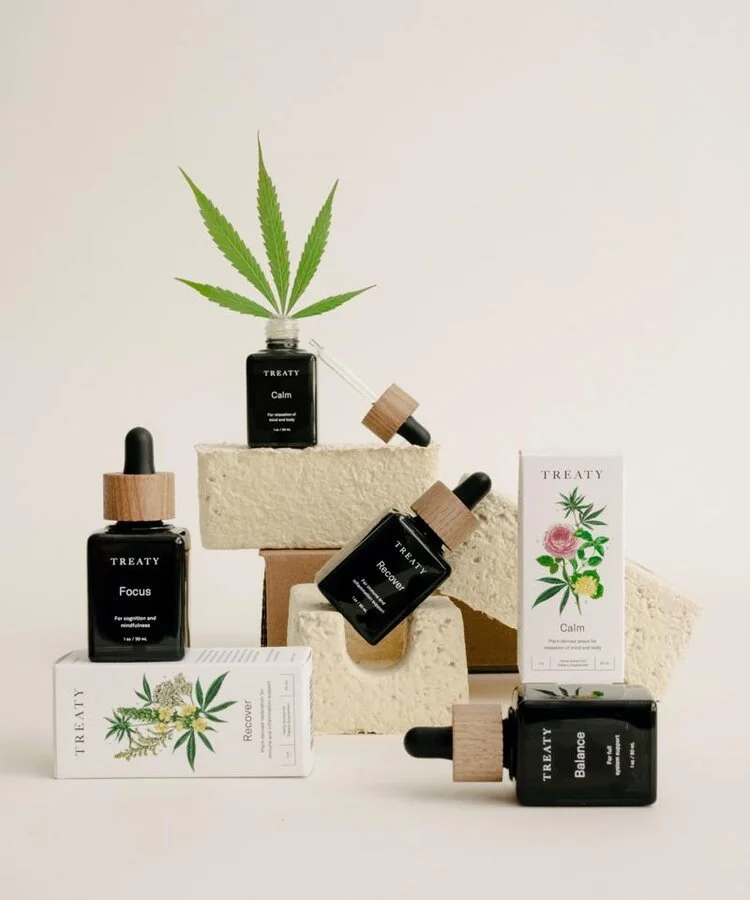INSIGHTs
Eating our Way to Extinction
A film by Ludo and Otto Brockway
“Eating Our Way to Extinction is a tour de force, lauded by the likes of Leonardo DiCaprio. We as individuals are left with no alternative but to reassess our personal choices.”
Pioneering agriculture in Brazil with a remarkable success story
How a dry wasteland in the Amazon has been transformed into rainforest with 17 streams and rivers and a cooler climate.
PLANT-BASED ECONOMIES ARE NOT ONLY POSSIBLE,
THEY ARE INEVITABLE
PLANTS AS BLUEPRINTS
FOR THE FUTURE
THE REASONS WHY
-

1. GLOBAL DEPLETION: Agriculture is one of the primary catalysts of global depletion.
Short amount of text here
-

2. THE GLOBAL WATER PROBLEM:
There are 900 million acres of land producing alfalfa in California. Each one of those 900 million acres requires 2 million gallons of water to irrigate. The alfalfa goes to feed dairy cows, beef cattle, sheep, chickens and turkeys. Most of the state’s water isn’t going to golf courses, and it isn’t going to lawn care. Between 60-70 percent of total consumptive water usage in California goes to livestock and crops grown to feed them.
60 percent of Ethiopia’s population suffers from hunger and thirst, and yet their dehydrated land is being used to support a growing herd of over 65 million cattle.
While Syria’s 18 million inhabitants are severely water stressed and there is civil unrest related to lack of water and agricultural issues, at the same time the country is trying to provide water to 47 million cattle, sheep, and goats.
Seven million livestock in Ethiopia, Kenya and Somalia have died due to drought since the fall of 2021, according to a recent report by USAID’s Famine Early Warning Systems Network. The carcasses of giraffes, goats, camels and droves of cattle have been found in villages after starving to death in northern Kenya. These losses can be ruinous for families.
40 percent of the largest ancient aquifers on earth are being overdrawn unsustainably and will become irreversibly depleted in our lifetime (GRACE TWS Trends – Increases and Decreases Over 13 Years, 2002-2015).
-

3. THE AMAZON UNDONE: “IF THE AMAZON IS TO DIE, IT WILL BE BEEF THAT KILLS IT.”
“Cattle ranching, responsible for the great majority of deforestation in the Amazon, is pushing the forest to the edge of what scientists warn could be a vast and irreversible dieback that claims much of the biome.”
The three main greenhouse gases fueling global heating – carbon dioxide, methane and nitrous oxide – all hit record highs in 2021. The majority of nitrous oxide comes from agriculture, including microbes in fertilized soils and animal manure. It is a potent greenhouse gas with about 300 times the heat-trapping power of carbon dioxide. One of the largest human sources of methane emissions is livestock farming.
-

4. “GLOBAL INDUSTRY IS ON THE CUSP OF A REVOLUTION POWERED BY TECHNOLOGY”
— Biden Administration
September 12, 2022 news conference -

5. 2017 TO TODAY: THE FUTURE EMERGES
The consumers that agriculture will serve 20 years in the future are very different from the consumers it serves today. Recognizing the changing global economy and the beginning of a period of the globalization of consumption, in 2017 the Canadian government created $3.5 billion in supercluster funding programs for Canadian farmers to help accelerate innovation, enhance economic growth and prosperity, and to encourage their global leadership in plant proteins.
The consumers that agriculture will serve 20 years in the future are very different from the consumers it serves today. Recognizing the changing global economy and the beginning of a period of the globalization of consumption, in 2017 the Canadian government created $3.5 billion in supercluster funding programs for Canadian farmers to help accelerate innovation, enhance economic growth and prosperity, and to encourage their global leadership in plant proteins.
2017 TO TODAY: THE FUTURE EMERGES
DEVELOPMENTS SINCE THEN:
If we are struggling to imagine the future, it is already there before us
There are now 780 + companies worldwide with a primary focus on plant-based meat, seafood, egg or dairy. In 2021, plant-based food sales grew 2.5 x faster than overall food sales.
-
Nestle’s announced that the company’s new goal is to ”offer a plant-based version of every animal protein around."
-
KFC and Chipotle began to offer a plant-based chicken menu
-
USDA awarded $10 million to Tufts for cellular agriculture.
-
Meat and dairy alternative startups raised $11 billion since 2010, with $5 billion of that raised in 2021, according to Crunchbase data.
-
Time Magazine Spotlight story, China’s New 5-Year Plan is a Blueprint for the Future of Meat. China’s Ministry of Agriculture and Rural Affairs released its official five-year agricultural plan on Jan. 26. For the first time, China included cultivated meats and other future foods like plant-based eggs as part of its blueprint for food security going forward.
-
“China is far and away the largest consumer of eggs and meat in the world, so incorporating plant-based eggs and cultivated meat into the country’s five-year plan is a significant indicator of what’s to come,” says Josh Tetrick, the CEO of California-based food-technology company Eat Just Inc. “In short, this is one of — if not the most — important policy actions in the history of alternative proteins.”
-
Boston Consulting Group, one of the world’s three largest management consulting firms by revenue, along with Bain & Company and McKinsey & Company, reports that investments in plant-based alternatives to meat lead to far greater cuts in climate-heating emissions than other green investments. BCG’s report found that investment in improving and scaling up the production of meat and dairy alternatives resulted in three times more greenhouse gas reductions compared with investment in green cement technology, seven times more than green buildings and 11 times more than zero-emission cars.
-
Blue Horizon: Founded in 2016, in six short years this trailblazing investment firm has become a powerful accelerator of the alternative protein sector and food tech, with a portfolio of companies that includes Just and Impossible Foods. Blue Horizon is a game-changer that has financed some of the most successful startups in plant food history.
-
”On September 12, 2022, President Biden signed an Executive Order to launch a National Biotechnology and bio-manufacturing Initiative to ensure the US can make in the US all that is invented in the United States. Biotechnology programs microbes to make specialty chemicals and compounds, a process called ‘biomanufacturing.’ These advances have led industry to embrace biomanufacturing as an alternative to petrochemical-based production to make things like plastics, fuels, materials, and medicines. Bioengineering could account for more than a third of global output of manufacturing industries before the end of the decade — almost $30 trillion in terms of value. The initiative explicitly supports food security and will drive agricultural innovation through new technologies, including foods made with cultured animal cells.”
"The global industry is on the cusp of a revolution powered by biotechnology," said a senior administrative official in a press conference announcing the executive order.
GLOBAL DEPLETION: Agriculture is one of the primary catalysts of global depletion. “By the year 2050, at current rates of deforestation, most tropical forests will be gone, and the countless animals, plants, lichens and mosses that have been living in them will also be gone. Their once abundant water systems will be destroyed, and of course their climate-regulating mechanisms will be lost for the next few millions of years, which is how long it took these rainforests to develop. There are powerful reasons for the building of large-scale, plant-based, climate-resilient systems to offset the mechanisms of forest loss. I see a picture of tremendous responsibility for humanity, but also opportunity of profound historical magnitude.”
— Richard Oppenlander
2. THE GLOBAL WATER PROBLEM: There are 900 million acres of land producing alfalfa in California. Each one of those 900 million acres requires 2 million gallons of water to irrigate. The alfalfa goes to feed dairy cows, beef cattle, sheep, chickens and turkeys. Most of the state’s water isn’t going to golf courses, and it isn’t going to lawn care. Between 60-70 percent of total consumptive water usage in California goes to livestock and crops grown to feed them.
60 percent of Ethiopia’s population suffers from hunger and thirst, and yet their dehydrated land is being used to support a growing herd of over 65 million cattle.
While Syria’s 18 million inhabitants are severely water stressed and there is civil unrest related to lack of water and agricultural issues, at the same time the country is trying to provide water to 47 million cattle, sheep, and goats.
Seven million livestock in Ethiopia, Kenya and Somalia have died due to drought since the fall of 2021, according to a recent report by USAID’s Famine Early Warning Systems Network. The carcasses of giraffes, goats, camels and droves of cattle have been found in villages after starving to death in northern Kenya. These losses can be ruinous for families.
40 percent of the largest ancient aquifers on earth are being overdrawn unsustainably and will become irreversibly depleted in our lifetime (GRACE TWS Trends – Increases and Decreases Over 13 Years, 2002-2015).
Carcasses of giraffes on the arid ground on the outskirts of a village in Kenya’s Wajir county. The animals died after getting stuck in mud when trying to drink from a reservoir that had almost dried up.
NO WATER, NO FUTURE. On June 1, 2022, the White House announced the first-of-its-kind Action Plan on Global Water Security. With almost half the global population expected to experience severe water stress by 2030, water security is now a key US foreign policy and domestic priority.
The NRDC states that 1,100 counties in the United States will be in water crisis by the year 2050. Yet, as freshwater supplies shrink globally and as countries run out of land and water, the U.S. also grows massive amounts of alfalfa and other forage crops for export to feed livestock overseas. Saudi Arabia has bought 14,000 acres of U.S. farmland in the drought-stricken American Southwest to grow water-intensive crops for its livestock.
3. THE AMAZON UNDONE: “IF THE AMAZON IS
TO DIE, IT WILL BE BEEF THAT KILLS IT.”
“Cattle ranching, responsible for the great majority of deforestation in the Amazon, is pushing the forest to the edge of what scientists warn could be a vast and irreversible dieback that claims much of the biome.”
The three main greenhouse gases fueling global heating – carbon dioxide, methane and nitrous oxide – all hit record highs in 2021. The majority of nitrous oxide comes from agriculture, including microbes in fertilized soils and animal manure. It is a potent greenhouse gas with about 300 times the heat-trapping power of carbon dioxide. One of the largest human sources of methane emissions is livestock farming.
4. “GLOBAL INDUSTRY IS ON THE CUSP OF A
REVOLUTION POWERED BY TECHNOLOGY”
— Biden Administration
September 12, 2022 news conference
Mycelium products are part of the evolution in natural materials that are helping to protect and restore nature.
5. 2017 TO TODAY: THE FUTURE EMERGES
The consumers that agriculture will serve 20 years in the future are very different from the consumers it serves today. Recognizing the changing global economy and the beginning of a period of the globalization of consumption, in 2017 the Canadian government created $3.5 billion in supercluster funding programs for Canadian farmers to help accelerate innovation, enhance economic growth and prosperity, and to encourage their global leadership in plant proteins.
DEVELOPMENTS SINCE THEN:
If we are struggling to imagine the future, it is already there before us
There are now 780 + companies worldwide with a primary focus on plant-based meat, seafood, egg or dairy. In 2021, plant-based food sales grew 2.5 x faster than overall food sales.
Nestle’s announced that the company’s new goal is to ”offer a plant-based version of every animal protein around."
KFC and Chipotle began to offer a plant-based
chicken menu
USDA awarded $10 million to Tufts for cellular agriculture.
Meat and dairy alternative startups raised $11 billion since 2010, with $5 billion of that raised in 2021, according to Crunchbase data.
Time Magazine Spotlight story, China’s New 5-Year Plan is a Blueprint for the Future of Meat. China’s Ministry of Agriculture and Rural Affairs released its official five-year agricultural plan on Jan. 26. For the first time, China included cultivated meats and other future foods like plant-based eggs as part of its
blueprint for food security going forward.
Mycelium is the highly dynamic stage of the mushroom life cycle. It is used to make building materials fire-resistant, stronger and lighter. It is used by the fashion industry to mimic the look and texture of leather and in the food industry to produce plant-based proteins. Mushrooms are being developed as a slow-release fertilizer in the agriculture sector. Mycelium is also under development as a unique mycopesticide that can target specific crop insects and not harm others.
Biohm, a biotech startup, has received backing to fund its work on breaking down plastics using mycelium. The results, which Biohm’s founders say will be transformational, are two years away from being available at scale. “We’re exploring projects in outer space at the moment, seeing how we can grow mycelium in a vacuum and looking at how we can break down toxins that have been completely irremediable.”
Unearthing the superpowers of fungus: “In the fight against warming, a formidable ally lies just below our feet. Fungi made the world as we know it. As some of the first life forms on the planet, they consumed minerals locked in rocks, creating what we now know as soil. Without them, there would be no plants on land, and therefore, no animals. No us.
Fungi give trees much-needed nutrients extracted from the soil. Carbon travels one way and nutrients like nitrogen and phosphorus the other. The underground entanglement is vital to life above. By one estimate, 5 billion tons of carbon flow from plants to mycorrhizal fungi annually.
— Somini Sengupta,
New York Times, July 27, 2022
“China is far and away the largest consumer of eggs and meat in the world, so incorporating plant-based eggs and cultivated meat into the country’s five-year plan is a significant indicator of what’s to come,” says Josh Tetrick, the CEO of California-based food-technology company Eat Just Inc. “In short, this is one of — if not the most — important policy actions in the history of alternative proteins.”
Boston Consulting Group, one of the world’s three largest management consulting firms by revenue, along with Bain & Company and McKinsey & Company, reports that investments in plant-based alternatives to meat lead to far greater cuts in climate-heating emissions than other green investments. BCG’s report found that investment in improving and scaling up the production of meat and dairy alternatives resulted in three times more greenhouse gas reductions compared with investment in green cement technology, seven times more than green buildings and 11 times more than zero-emission cars.
Blue Horizon: Founded in 2016, in six short years this trailblazing investment firm has become a powerful accelerator of the alternative protein sector and food tech, with a portfolio of companies that includes Just and Impossible Foods. Blue Horizon is a game-changer that has financed some of the most successful startups in plant food history.
”On September 12, 2022, President Biden signed an Executive Order to launch a National Biotechnology and bio-manufacturing Initiative to ensure the US can make in the US all that is invented in the United States. Biotechnology programs microbes to make specialty chemicals and compounds, a process called ‘biomanufacturing.’ These advances have led industry to embrace biomanufacturing as an alternative to petrochemical-based production to make things like plastics, fuels, materials, and medicines. Bioengineering could account for more than a third of global output of manufacturing industries before the end of the decade — almost $30 trillion in terms of value. The initiative explicitly supports food security and will drive agricultural innovation through new technologies, including foods made with cultured animal cells.” "The global industry is on the cusp of a revolution powered by biotechnology," said a senior administrative official in a press conference announcing the executive order.
On November 16, 2022, the U.S. Food and Drug Administration (FDA) for the first time cleared a meat product grown from animal cells for human consumption. UPSIDE Foods, a company that makes cell-cultured chicken by harvesting cells from live animals and using the cells to grow meat in stainless-steel tanks, will be able to bring its products to market once it has been inspected by the U.S. Department of Agriculture (USDA), said a release from the FDA. "This is a watershed moment in the history of food," Uma Valeti, CEO and founder of the California-based company, said in a statement. "U.S. consumers will soon have the chance to eat delicious meat that's grown directly from animal cells."
China — the nation that invented paper, printing, and even compasses — claims it is now ready to mass-produce cultivated meatballs. Researchers from Tsinghua University and Nanjing Agricultural University report their innovation may pave the way for cultured meat to be industrialized.
— Paul Shapiro
Björn Witte, CEO of Blue Horizon
JBS, the world’s biggest meat company, began to
invest in cultivated meats.
ADM, one of the US's most massive agribusinesses,
formed a partnership with Eat Just to accelerate
cultivated meat development.
Precision fermentation, the world’s most important new environmental technology, attracted significant
investment. A form of brewing, precision fermentation
multiplies microbes that have been used for many years
to produce drugs like insulin and food additives. In
several labs and factories, scientists are developing a new
generation of foods biologically identical to the proteins of farmed animals. By 2022, 88 fermentation companies were focused exclusively or predominantly on alternative proteins and 25 countries had at least one company focused primarily on fermentation. Over 50 percent of companies devoted to fermentation-enabled alternative protein applications were formed from 2019 to 2021. Over 80 percent of alternative protein fermentation companies have launched in the past five years.
Data courtesy of GFI, https://gfi.org/
Formo, a Berlin-based startup that uses microorganisms
to produce animal-free proteins, is “moving towards precision-
fermented dairy at an an industrial scale and affordable price.”
Sweden-based Melt and Marble has developed a precision
-fermentation derived beef fat alternative.
Fast food moves away from meat: In October 2022,
Burger King announced that it will be making another
one of its restaurants 100 percent vegan. From
October 26 until November 6, 2022 the branch on
The Mall site in Cribbs Causeway, Bristol, will only
serve plant-based products. Earlier this year, Burger
King announced that it would make its entire menu
50 percent meat-free by 2030. The chain has previously
released vegan versions of iconic products like the
Whopper and Chicken Royale, which it sells in restaurants
across the UK.
Israeli startups have carved out a leading place in
developing new alternative proteins. Startups
from Israel placed No. 2 worldwide in terms of money
invested last year, trailing only the United States.
According to a nonprofit that advances research
and promotes government support for alternative
proteins, they attracted greater investments than
companies from the entire European Union combined.
In 2022, Australian alternative protein company Vow
opened what it says is the largest cultivated meat facility
in the southern hemisphere, in Alexandria in Sydney.
In November 2022, Blue Horizon announced a seed
investment in NuCicer, an agri-food technology company
pioneering ultra-high protein non-GM chickpeas by
harnessing the biodiversity of wild chickpea. The funding is led by Leaps by Bayer, the impact investing arm of Bayer AG – the largest global seed company, with participation from Blue Horizon, Lever VC and Trellis Road. The funding will allow NuCicer to scale production of its first-generation chickpea varieties with 75% higher protein content, targeting to reduce chickpea protein ingredient costs by 50%, and expand existing work to bring affordable, sustainable plant proteins to consumers in 2023. Long-term, the stability of the global food system relies on improving the climate resilience of crops. Chickpeas possess climate resilient traits, including high water-use efficiency and nitrogen fixation capabilities that contribute to soil regeneration.
Silicon Valley venture capital is feeding a budding business
in fermented animal-free proteins, creating bacon, turkey
and egg white from yeasts and fungus. The Every Company
is producing real animal protein without using an animal.
It is identical to what the animal makes. Backed by $233
million in funding, it prints the DNA protein sequence that
codes for any protein on demand and feeds that to yeast.
As the yeast reads the DNA, it starts printing out a specific
protein. Fermented proteins is a budding industry within
the alternative meat sector that’s found a home in San
Francisco and plenty of capital. “Fermentation is one of
the top dogs right now. It has a clean, short ingredient
list, unlike the plant-based alternatives that have 12 to
15 ingredients.” “Once Generation Z and Generation Alpha
have control of the wallet, we will see changes happen faster.”
In August of 2022, international dairy company Lactalis announced it would convert its Ontario dairy milk processing facility into a dedicated plant-based milk production facility. The company’s press release stated, “This is the result of long-term volume decline and increased costs in the fluid milk market in Ontario that have led to decreased profitability and economic
sustainability of Lactalis Canada’s fluid operations
in Sudbury.”
The Dutch city of Haarlem will become the first in the
world to ban meat adverts from public spaces in an effort
to reduce consumption and greenhouse gas emissions.
Haarlem, which lies to the west of Amsterdam and has a
population of about 160,000, will enact the prohibition from
2024 after meat was added to a list of products deemed
to contribute to the climate crisis. Adverts will not be allowed
on buses, shelters or screens in public places in Haarlem,
home to 160,000 people.
GOOD Meat, the cultivated meat division of Eat Just, struck a deal for the largest known bioreactors for avian and mammalian cell culture for a US cultivated meat facility. The commitment
to build four-story bioreactors in the U.S. is positioned to become a game-changer for the cultivated meat industry. The bioreactors will supply tens of thousands of shops and restaurants.
PepsiCo announced a joint venture with Beyond Meat to create a line of plant-based snacks and beverages, with a line of jerky to be their first product for retail release in 2022.
Target expanded their Good & Gather line with more than 30 new plant-based products across categories, including Meatless Meatballs, Chick’n Tenders, seasoned cashew dips and plant-based milk and creamers.
The fastest-growing food order on Grubhub in 2021
was the Impossible Cheeseburger.
In 2021, Starbucks turned one of their Seattle stores
into a test site for a 100 percent plant-based menu.
In addition to plant-based expansions in the United
States, Starbucks also launched new plant-based
collaborations in Hong Kong, Indonesia and the
Middle East.
Dicos, one of mainland China’s largest fast-food chains, announced they would use JUST Egg as the default on several sandwiches and plates—the first-ever replacement of chicken eggs with plant-based eggs at a major quick-service chain.
Burger King launched a plant-based Whopper in Singapore and Indonesia.
Burger King Austria now Asks Customers, 'Regular or With Meat?' The chain will automatically serve non-meat options unless specified otherwise by customers.
IKEA Indonesia added new plant-based dishes to their menu.
Unilever-owned brand The Vegetarian Butcher
launched six new plant-based meat products in
the foodservice channel in mainland China.
Next Gen Foods released chicken made from soy
and wheat protein in Singapore restaurants and
plans to expand to additional APAC countries,
the United States, Europe and the Middle East.
Yum Brands and McDonald’s signed strategic
partnerships with Beyond Meat. As part of the global
strategic partnership, Yum Brands will launch exclusive plant-based menu items using Beyond Meat that will be available only at KFC, Pizza Hut and Taco Bell.
In December 2021, McDonald’s announced they would expand the McPlant offering to more than 700 U.S. restaurants in 2022 and soon after announced the expansion to the United Kingdom.
Thai Union, the world’s largest producer of canned tuna, launched their own plant-based line called OMG Meat, which includes alternatives to pork and crab meat.
Eat Just partnered with foodservice management giant Sodexo. Sodexo is a food services and facilities management company headquartered in Paris that has 428,237 employees and a presence in 80 countries. It is the world's leading provider of catering, hospitality and food retail services, serving 100 million meals a day and catering for every sector, including for schools,
universities, hotels and airlines.
JUST Egg was added to the menus of U.S.-based Peet’s and Dicos in China.
In January 2022, AMC Theaters across the United States launched Impossible Chicken Nuggets as a plant-based
option at their concession stands.
In spring of 2022, JBS purchased a 51% stake in BioTech Foods, a Spanish cultivated-meat company. JBS plans to build a production plant for cultivated meat in San Sebastián, on Spain’s northern coast near the French border. The $40 million plant is
expected to have an annual capacity of 1,000 tons when it begins operations in mid-2024.
Boston Gets Largest Vegan Sports Bar in the World. A new vegan sports bar, PlantHub, is opening in Boston, Massachusetts. PlantPub’s second location is across from Fenway Park baseball stadium, the 110-year-old home of the Red Sox. The new PlantPub will serve burgers, Buffalo cauliflower wings, nachos, and pizza, New England desserts like Boston cream pie and sundaes. PlantPub’s new branch is over five times the size of the original location, which launched in Cambridge last year at 8,000
square feet. It can seat nearly 300 people.
In 2022, Amazon Fresh launched an all plant-based line with a new budget-friendly range of meatless and dairy-free products. The subsidiary of e-commerce giant Amazon launched a new range of meatless and dairy-free products, including meatballs, patties, nuggets and almond milk. The line, called Fresh
Plant-Based, is available online and in-store at its growing empire of futuristic supermarkets.
In 2022, Cadbury’s launched a 100 percent plant-based line of chocolate bars.
In early 2022, the premier meat industry online publication
Meatingplace began producing a magazine solely devoted to animal-free meat. Meatingplace is the prevailing marketplace publication read by livestock farmers and giant agribusiness producers and distributors.
In June of 2022, both Cracker Barrel and United Airlines
added Impossible Sausage to their menus.
In August of 2022, Kevin Hart, one of the world’s highest
earning comedians, took on fast-food chains with his new
vegan fast-food restaurant, Hart House, in Los Angeles.
Hart is going after other fast-food chains banking on a
rapidly growing trend in the fast-food market.
— Data courtesy of Paul Shapiro and GFI
Footwear made with mushroom materials
The Cellulosic Age: Biocomposites (composite materials reinforced by natural materials like hemp, jute, kenaf, sisal) are used by car manufacturers because they reduce vehicle weight, which improves performance and lowers CO2 emissions. They are used in car interiors for components like door and floor panels, but they also have more structural applications and are used in the manufacture of railway coaches, aerospace, construction and packaging. Stem fibres are of considerable interest for the emerging biofiber industry; they are gaining momentum as a key material in manufacturing industries, including production of particle boards and plastic products. Natural fibers are cheaper, lighter in weight and less abrasive than fiberglass, require less energy to manufacture and are easier to decompose or burn. The demand for plant fibres in plastic composites is growing by more than 50% annually in Europe.
In the race to find sustainable technology and emerging materials that reduce our ecological footprint, one of the most promising materials is the mycelium brick. This 100 percent organic material is super strong, water, mould and fire-resistant. Calcium silicate or sand lime bricks contain high amounts of sand—about 88–92 percent. Sand is the most extracted solid material in the world, and the second-most used global resource behind water. An unregulated material, it is used extensively in nearly every construction project on Earth. It is also a resource that the world is running out of.
Mycelium packaging helps solve the beauty industry’s waste problem.
The Hermes bag, produced with hybrid materials in a collaboration between Hermès and MycoWorks.
Mycelium is a sustainable alternative to plastic foams such as polystyrene. Rather than break down into microbeads harmful to wildlife and marine habitats, mycelium packaging breaks down into useful nutrients for the soil. IKEA and Dell have been using biodegradable mycelium products for years as part of their efforts to reduce synthetic waste that is harmful to the environment and that crumbles into small particles that animals ingest.


















